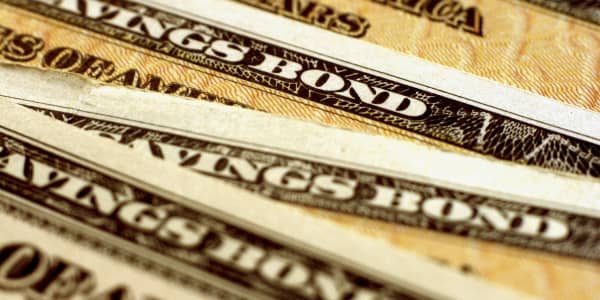For the last 20 years, it didn't particularly matter whether you owned U.S. bond funds or individual bonds.
Fueled by falling interest rates, they both delivered consistent income and a counterbalance to equity market volatility. No wonder the market grew faster than the domestic economy and tripled in size to just under $37 trillion.
But with higher rates on the horizon and the Federal Reserve slowly reducing the pace of its quantitative easing measures, investors are about to get schooled in just how different these securities can be. For financial advisors who have experienced only a bond market rally in their careers, this promises to be an eye-opener.
All about bonds
"There is a huge difference between bond funds and individual bonds," said Scott Colyer, CEO and chief investment officer for Advisors Asset Management. "Some suggest that they're not even the same asset class, because bond funds react so differently to market forces. Now more than ever, with interest rates heading up, investors need to understand the difference," he said.
Here's the 411 on how bond funds and individual bonds differ, and why it matters to you.
Read MoreKeep bonds but stay alert, say advisors
Individual bonds, like Treasurys, municipals and corporate bonds, are sold with a finite maturity: the date on which you, the investor, get your principal back — if the debt issuer doesn't default — and the interest payments you've been receiving stop. Bonds backed by the federal government (or Treasurys), for example, can be purchased with maturities of anywhere from one month to 30 years.
Investors who purchase individual bonds, either through a broker or directly from the U.S Department of the Treasury, can expect to receive coupon (interest) payments about twice a year.
If you own individual bonds with a fixed rate of return (yield) and hold them to maturity, interest-rate fluctuations from the Federal Reserve impact neither your principal nor your income stream.
It's all just noise that results in either a paper gain or loss.
Market risk becomes a factor, however, if you sell your bond before maturity. Depending on the price you paid for the bonds, the amount of interest you've already collected and current interest rates, it can result in either a profit or a loss.
Now … about bond funds
Fixed-income mutual funds are a different animal.
Bonds held within the fund portfolio are designed to mature on a staggered basis so that income payments are delivered consistently. The fund manager replaces bonds as they mature, when the issuer's credit is downgraded and when the issuer "calls," or pays off the bond before the maturity date.
Some bond funds are designed to mimic the broader market, while others specialize in high-yield (junk) bonds, short-term debt, emerging markets or tax-free municipals from state and local governments.
Bond-fund investors can expect a monthly payout of the income earned by the fund.
Read MoreLearning the ABCs of bonds
Because you own mutual-fund shares, however, there is no maturity date on which you can expect to get back "par," or the face value of the bond.
"It's what I call 'perpetual duration,'" said Colyer. "When you own bond mutual funds, there is never a day that you are assured of getting back 100 percent of your principal."
Many investors mistakenly believe the diversification inherent in a bond fund renders them more insulated from market forces, said Greg Ghodsi, senior vice president of investments at Raymond James.That's not the case.
With mutual funds, he noted, rising rates can create a snowball effect that drives prices quickly lower.
Selloffs, supply and price
A $300,000 investment in a fixed-income mutual fund with an average maturity of 20 years (a mix of 10-, 20- and 30-year bonds), for example, would fall to $260,000 if interest rates climb 1 percent. (Shorter-term bond funds would be less volatile.)
The drop in value makes investors nervous, which prompts more selling.That, in turn, forces the bond-fund manager to sell off some of their bonds to meet redemptions.
Depending on how significant the redemptions are, they may have to sell off their highest-yielding bonds and replace them with those offering a lower yield, or assume more risk to obtain the same return.
"What happens in the marketplace is all those bonds from the fund manager start going out to bid to be sold, and that creates more supply in the market—and more supply drives prices lower," Ghodsi said. "It's a downward cycle. It takes very little shift in the supply and demand to cause prices to shift pretty dramatically."
Read MoreInvestors yield to bonds' charms
Eventually, this surge in supply and subsequent price shift impacts even buy-and-hold bond fund investors.
"There are people who say, 'I'm going to hold them forever, anyway, so it doesn't matter.' But it does, because now with all the redemptions and selling, all of a sudden, all those high-income bonds are gone and the fund manager now has to cut their dividend, so your actual income goes down," Ghodsi said. "You get squeezed from both ends. Not only does the statement show a lower value, but now your income gets cut, too."
By comparison, if you own $300,000 worth of fixed-rate individual bonds with an average maturity of 20 years and interest rates go up 1 percent, the value of those bonds on your statement might be down, but your income remains unchanged and you'll still get your principal back when the bonds mature—assuming, again, that you buy and hold and the debt issuer doesn't default.
Pros and cons
There's also a cost advantage to owning individual bonds, Ghodsi said.
If you purchase a 20-year Treasury directly from the government, for example, you'll pay the spread—the difference between the bid and the ask—which is roughly 1 percent for Treasurys today. For a $100,000 purchase of 20-year Treasuries, your total cost is $1,000 for the life of the bond.
With bond funds, you pay an annual expense ratio that covers marketing, administrative and professional management fees. According to mutual fund tracker Morningstar, the average expense ratio for fixed-income mutual funds is 0.972 percent.
Does it make more sense to swap your bond mutual funds for a portfolio of individual bonds in a rising-rate environment, then?
Read MoreDealing with rising rates, step by step
Not necessarily, said Chris Bouffard, chief investment officer at The Mutual Fund Store.
Individual bonds are best suited for investors who understand the nuances of the yield curve, have the time and resources to monitor credit risk and have sufficient means to construct a portfolio with adequate diversification.
It matters, too, what type of bond investment you're looking to buy.
Treasurys are less complicated and have the lowest credit risk among fixed-income securities, making them better candidates for direct investment.
Municipal bonds, emerging markets bonds and high-yield bonds that utilize leverage to offset market risk, on the other hand, are best left to professional managers, Bouffard said.

Remember, too, that bond mutual funds are potentially more liquid, or easier to sell.
Bond funds can be sold at any time for their current market net-asset value, which may result in a capital gain or loss. Individual bonds can be harder to unload.
The secondary market for Treasurys and high-quality corporate bonds, for example, is more robust than it is for municipal bonds or high-yield bonds, which become less liquid still when interest rates rise.
Read MoreAre bonds safe? It depends
"The best benefit of owning a bond mutual fund is that you could pick up the phone and by 4 p.m. on any trading day, you could get your money out," said Ghodsi at Raymond James. "With individual bonds, you'd need to sell issues and get bids on all of your issuers in the marketplace."
Some suggest investors with less than $500,000 allocated to fixed-income holdings should stick with mutual funds for their diversification benefits, but Ghodsi and Colyer dispute that notion. They say it's possible to achieve a balanced mix of individual bonds with a far smaller investment.
"If you stick with high-quality corporate bonds, or government-backed bonds that are A-rated or better, you can build a diversified portfolio of individual bonds for $100,000," said Ghodsi. "We feel mutual funds are good for smaller accounts that are still accumulating money, but once our clients hit that $100,000 threshold, we generally advise that they slowly convert to individual bond funds."
UITs an option
There is one other option to consider: the unit bond investment trust. UITs are exchange-traded, professionally selected portfolios of individual bonds, offering the benefit of professional guidance without the management fees.
Fund managers do not actively manage the portfolio but may replace bonds in their portfolio if a company goes bankrupt or merges.
When the bonds mature, your principal is returned, because you own each bond individually.
Ghodsi cautioned, however, that investors should be aware there's little flexibility with UITs. They can't just sell one bond within the fund if the issuer's creditworthiness falters.
Read MoreSky-high interest rates of yore
"If the prospectus for the UIT indicates they're buying only high-quality bonds, then the odds of trouble are pretty small, but some focus on higher-yield bonds, which are more risky," he said. "Investors may think they're getting a diversified package of bonds, but what happens if one of those bonds gets into trouble? You own that portfolio of bonds, and you can't just sell one in the portfolio."
Bond funds and individual bonds behave very differently in a rising interest-rate environment. Determining which is right for you ultimately comes down to resources and your level of sophistication.
"Bond mutual funds are neither better nor worse," said Ghodsi. "They're just different—as long as the individual investor understands what they're getting into, so they can make informed decisions."




